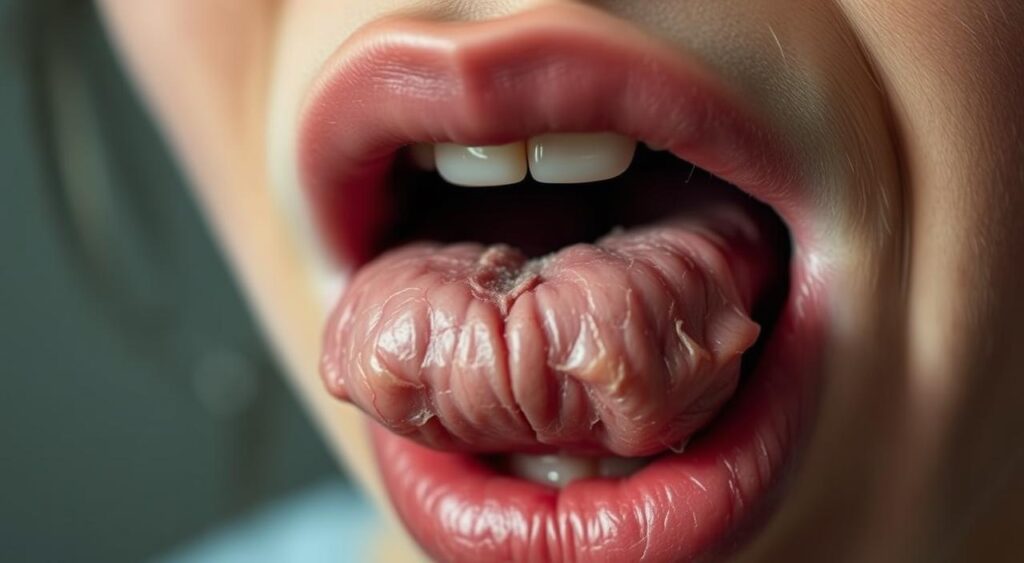Discover the ultimate guide to understanding and managing dryness of mouth. Learn causes, symptoms, and effective treatments.
Did you know that millions of people worldwide experience the discomfort of dry mouth? This common condition, known as xerostomia, occurs when the salivary glands don’t produce enough saliva. It’s more than just an annoying feeling; it can lead to serious oral health issues if left untreated.

Insufficient saliva doesn’t just affect your comfort—it can also hinder your ability to eat, speak, and even digest food properly. Dry mouth can be a sign of an underlying health issue, making it crucial to address it promptly. This article will guide you through actionable strategies to find relief and manage this condition effectively.
Understanding the symptoms and causes of dry mouth is the first step toward proper treatment. Whether it’s due to medication, health conditions, or lifestyle factors, knowing the root cause can help you take the right steps to alleviate your discomfort. Your overall health and well-being are connected to your oral health, so it’s important to seek expert guidance.
Keep reading to learn how to tackle dry mouth and restore your oral health. With the right approach, you can say goodbye to the feeling of dryness and hello to a healthier mouth.
Key Takeaways
- Dry mouth, or xerostomia, affects millions and can lead to oral health issues.
- Insufficient saliva can impact eating, speaking, and digestion.
- Addressing the root cause is crucial for effective treatment.
- Understanding symptoms and causes helps in managing the condition.
- Proper treatment can restore oral health and overall well-being.
Understanding Dry Mouth: Causes and Symptoms
Dry mouth, or xerostomia, is a condition where the salivary glands don’t produce enough saliva, leading to discomfort and potential oral health issues. It’s important to understand both the direct and indirect causes, as well as recognize early symptoms to manage the condition effectively.
Common Causes of Dry Mouth
Several factors can cause dry mouth. Medications, especially those used to treat depression, high blood pressure, and allergies, are common culprits. Dehydration, whether due to illness or not drinking enough water, can also lead to reduced saliva production. Additionally, lifestyle habits such as smoking and mouth breathing can contribute to dry mouth.
Recognizing Early Symptoms
Early symptoms of dry mouth include a sticky feeling in the mouth, cracked lips, and a dry, red, raw tongue. You might also experience difficulty chewing or speaking, and your sense of taste may be altered. It’s crucial to address these symptoms early to prevent more serious oral health complications.
Recognizing these signs early can help you take the right steps to alleviate discomfort and maintain your oral health. Understanding the causes and symptoms is the first step toward effective management of dry mouth.
Medical Conditions and Medications Leading to Dry Mouth
Various medical conditions and medications can significantly impact saliva production, leading to dry mouth. Understanding these factors is essential for effective management.
How Medications Impact Saliva Production
Certain medications are known to reduce saliva production as a side effect. Drugs used to treat depression, anxiety, and allergies are common culprits. These medications can alter the body’s ability to produce saliva, leading to dry mouth. Additionally, over-the-counter medications, such as decongestants and antihistamines, can also contribute to this condition.
When these drugs affect the salivary glands, they can cause a noticeable decrease in saliva flow. This reduction can lead to discomfort and difficulty in eating and speaking. It’s important to discuss any concerns with your healthcare provider, as adjusting medications or dosages may help alleviate symptoms.
Diseases Associated with Dry Mouth
Certain diseases directly impact the salivary glands, leading to dry mouth. Sjögren’s syndrome, an autoimmune disorder, is a primary example, as it specifically targets the glands responsible for saliva and tear production. Other conditions, such as diabetes and Parkinson’s disease, can also cause reduced saliva production.
In some cases, treatments for head and neck cancer, including radiation therapy, can damage the salivary glands. This damage can result in chronic dry mouth. Blood tests and diagnostic measures are crucial in identifying these underlying conditions and guiding appropriate treatment plans.
Understanding the connection between these diseases and dry mouth is vital for seeking proper medical advice and managing symptoms effectively.
Lifestyle Factors and Daily Habits Affecting Oral Moisture
Your daily habits and lifestyle choices can significantly influence oral moisture levels, often contributing to the discomfort of dry mouth. While some factors may seem minor, their cumulative effect can lead to noticeable dryness and related issues.
The Role of Smoking and Mouth Breathing
Smoking is a well-known culprit when it comes to reducing saliva production. The chemicals in tobacco products can irritate the salivary glands, leading to a decrease in saliva flow. This not only causes dry mouth but also increases the risk of oral infections and bad breath.
Mouth breathing, especially during sleep, can also lead to a loss of moisture. When you breathe through your mouth instead of your nose, it bypasses the natural humidification process, causing your mouth to dry out. Over time, this habit can exacerbate the problem of dry mouth, making it more challenging to manage.

- Smoking directly damages the salivary glands, reducing saliva production and increasing the risk of oral health issues.
- Habitual mouth breathing, particularly at night, leads to overnight moisture loss, worsening dry mouth symptoms.
- Poor lifestyle choices, such as inadequate hydration and a diet high in sugars, further contribute to oral dryness.
- The combined effect of these habits creates a higher risk of developing chronic dry mouth and related complications.
- Studies show a strong link between lifestyle factors like smoking and mouth breathing, and an increased likelihood of experiencing dry mouth.
“Addressing lifestyle factors is a crucial step in managing dry mouth, as these habits can significantly impact oral health.” – Dr. Jane Smith
By understanding how your daily habits affect oral moisture, you can take proactive steps to reduce the risk of dry mouth and maintain a healthier smile.
Effective Strategies for Managing Dryness of Mouth
Managing dry mouth effectively requires a combination of at-home remedies and the use of over-the-counter products. These strategies can help stimulate saliva flow and provide immediate relief from discomfort.
At-Home Remedies and Hydration Tips
Sipping water frequently throughout the day is one of the simplest ways to maintain oral moisture. Staying hydrated helps your body produce enough saliva to keep your mouth comfortable. Additionally, chewing sugar-free gum or sucking on sugar-free candies can stimulate your salivary glands, promoting saliva production.
Drinking water regularly ensures your body has enough fluids to produce saliva. Even mild dehydration can reduce saliva flow, so keeping a water bottle nearby can serve as a helpful reminder to stay hydrated.
Utilizing Over-the-Counter Products
Over-the-counter sprays, gels, and lozenges can provide quick relief from dry mouth symptoms. These products often contain ingredients that help mimic natural saliva, offering temporary comfort and making it easier to eat, speak, and swallow.
When using these products, follow the instructions carefully to ensure effectiveness. They are designed to supplement your body’s natural saliva production, helping you manage dry mouth until more permanent solutions are implemented.
The Role of Salivary Glands in Oral Health
Your salivary glands play a vital role in maintaining your oral health. These glands produce saliva, which is essential for keeping your mouth moist, aiding digestion, and protecting your teeth from decay.
How Saliva Supports Digestion and Oral Hygiene
Saliva is more than just a natural mouth moisturizer. It contains enzymes that break down food, making digestion easier. It also neutralizes acids and helps prevent tooth decay by rinsing away harmful bacteria.
| Function of Saliva | Importance |
|---|---|
| Moistening Food | Makes chewing and swallowing easier |
| Neutralizing Acids | Protects teeth from decay |
| Antibacterial Properties | Prevents infections and bad breath |
| Aiding Digestion | Breaks down food for better absorption |
When salivary glands are damaged, it can lead to chronic dry mouth, increasing the risk of infections and tooth decay. Researchers are now exploring innovative solutions, such as artificial salivary glands, to address this issue.
Dietary Adjustments to Combat Dry Mouth
Adjusting your diet can play a significant role in managing dry mouth symptoms. By making informed food choices, you can help stimulate saliva production and maintain a healthier mouth.
Foods that Boost Saliva Production
Certain foods are known to naturally stimulate the salivary glands. Incorporate moisture-rich foods like cucumbers, watermelon, and celery into your diet. These foods not only help keep your mouth moist but also provide essential nutrients.
- Fresh fruits with high water content, such as strawberries and oranges, can encourage saliva flow.
- Yogurt and cheese are excellent sources of calcium and protein, supporting overall oral health.
- Leafy greens like spinach and kale are rich in vitamins that promote healthy saliva production.
Cautions: Foods and Beverages to Avoid
Some foods can worsen dry mouth symptoms. Avoid spicy or acidic foods, as they can irritate the mouth and reduce saliva production. Caffeinated beverages and alcohol can also dehydrate you, leading to a drier mouth.
- Limit consumption of salty or sugary snacks, as they can exacerbate dryness.
- Choose water or herbal teas over carbonated drinks to stay hydrated and protect your oral health.

A balanced diet is crucial for maintaining oral health. By selecting the right foods and avoiding irritants, you can effectively manage dry mouth and enjoy a more comfortable smile.
Oral Hygiene Practices for Dry Mouth Relief
Proper oral hygiene is essential for managing dry mouth and preventing complications like tooth decay and gum disease. Without enough saliva, your mouth loses its natural defense against harmful bacteria, making consistent hygiene practices even more critical.
Effective Brushing and Flossing Techniques
Brushing your teeth at least twice a day with a fluoride toothpaste is vital. Use gentle circular motions to cover all surfaces. Don’t forget the areas where your teeth and gums meet. Flossing once daily helps remove plaque between teeth, where a toothbrush can’t reach.
For those with dry mouth, consider using a soft-bristle toothbrush and a fluoride toothpaste designed for sensitive teeth. These products can help strengthen tooth enamel and reduce the risk of decay.
The Role of Saliva in Oral Health
Saliva naturally cleans your mouth by rinsing away food particles and neutralizing acids. When saliva production is low, your teeth are more vulnerable to decay. This is why consistent oral hygiene becomes even more important.
| Condition | Characteristics |
|---|---|
| Healthy Mouth | Natural saliva flow; teeth protected from decay; healthy gums. |
| Dry Mouth | Reduced saliva; increased risk of decay and gum disease. |
Recommended Products for Dry Mouth
Specialized mouthwashes and toothpastes for dry mouth can provide extra protection. Look for products containing xylitol, which helps prevent bacteria growth. Avoiding sugary or acidic foods also supports oral health.
Regular Dental Check-Ups
Visit your dentist regularly for early detection of issues. Professional cleanings can help prevent decay and gum disease. Your dentist may also recommend fluoride treatments or varnishes for added protection.
“Consistent oral hygiene and regular dental visits are crucial for managing dry mouth and preventing complications.” – Dr. Sarah Johnson
By maintaining good oral hygiene practices, you can effectively manage dry mouth and protect your teeth and gums from potential issues.
Medical Treatments and Professional Guidance
When home remedies aren’t enough, professional medical treatments can provide the relief you need. If your dry mouth persists, it’s crucial to consult a dentist or doctor to explore further options.
Prescription Medications and Therapies
Doctors may prescribe medications like salivary gland stimulants to increase saliva production. These can be especially helpful if your dry mouth is caused by medications or certain medical conditions. In some cases, artificial saliva or salivary substitutes may be recommended to mimic natural saliva and provide comfort.
Diagnostic Tests
Your healthcare provider might recommend tests to measure your salivary output and identify underlying causes. These tests can help determine if your dry mouth is linked to an infection or another condition that needs attention.
Consulting Your Dentist and Doctor
Regular check-ups with your dentist are vital for early detection of issues like tooth decay or gum disease. Your dentist can also suggest specialized mouthwashes or toothpastes designed for dry mouth. Additionally, your doctor can help adjust medications or address any underlying health conditions contributing to your symptoms.
| Treatment Type | Description | Importance |
|---|---|---|
| Prescription Medications | Stimulate saliva production | Addresses root causes |
| Salivary Substitutes | Mimic natural saliva | Provides immediate relief |
| Diagnostic Tests | Measure salivary output | Identifies underlying causes |
| Dental Check-Ups | Monitor oral health | Prevents complications |
Untreated dry mouth can lead to infections and other complications, making professional guidance essential. By working with your dentist and doctor, you can create a personalized treatment plan to manage your symptoms effectively.
Lifestyle Modifications and Preventative Measures
Simple changes in your daily routine can make a big difference in managing dry mouth. One of the most effective ways to prevent nighttime dryness is by establishing a consistent bedtime routine.
Establishing a Nighttime Routine for Relief
At night, your body naturally produces less saliva, which can worsen dry mouth symptoms. To combat this, consider using a humidifier in your bedroom. The added moisture in the air can help keep your mouth feeling more comfortable throughout the night.
Another helpful tip is to adjust your sleeping position. Using an adjustable pillow to elevate your head can encourage nasal breathing, reducing the likelihood of mouth breathing that dries out your mouth. Avoid consuming alcohol or caffeine before bed, as these can dehydrate your body and worsen dry mouth.
Incorporating these small changes into your daily life can significantly reduce the frequency and severity of dry mouth. By taking proactive steps, you can improve not only your oral health but also your overall well-being.
“Consistent nighttime routines and simple lifestyle adjustments can greatly alleviate dry mouth symptoms and enhance your quality of life.” – Dr. Emily Davis
Conclusion
Living with dry mouth doesn’t have to be a permanent challenge. By understanding its causes, recognizing symptoms early, and adopting practical strategies, you can effectively manage this condition. Whether it’s through simple lifestyle adjustments, consistent oral hygiene practices, or seeking professional treatments, there are numerous ways to find relief and restore your oral health.
Remember, dry mouth is more than just discomfort—it can impact your overall well-being. Early detection and proactive steps are key to preventing complications. If symptoms persist, consulting a healthcare professional can provide personalized solutions and ensure your oral health remains in top shape.
Taking charge of your oral health today can lead to a more comfortable and healthier tomorrow. With the right approach, you can overcome dry mouth and enjoy a life free from its challenges.
FAQ
Q: What are the primary causes of dry mouth?
A: Dry mouth, or xerostomia, is often caused by reduced saliva production. Factors include certain medications, medical conditions like Sjögren’s syndrome, aging, or side effects of treatments such as chemotherapy or radiation therapy in the head and neck area.
Q: How does saliva production impact oral health?
A: Saliva plays a crucial role in maintaining oral health by neutralizing acids, preventing tooth decay, and aiding in digestion. Insufficient saliva can lead to gum disease, infection, and increased risk of oral health issues.
Q: Can lifestyle choices contribute to dry mouth?
A: Yes, lifestyle factors such as smoking, excessive alcohol consumption, and mouth breathing can reduce saliva flow and worsen dry mouth symptoms. Additionally, a diet high in sugary or spicy foods can further irritate the condition.
Q: What are effective ways to treat dry mouth at home?
A: Staying hydrated by drinking plenty of water is essential. Chewing sugar-free gum can stimulate saliva production. Avoiding caffeine and alcohol can also help. Using a humidifier at night may provide additional relief.
Q: When should I consult a dentist or doctor about dry mouth?
A: If dry mouth persists or worsens, it’s important to seek professional advice. A dentist or doctor can identify underlying causes, such as medication side effects or diseases, and recommend appropriate treatments, including prescription medications or therapies.
Q: Are there specific foods that can help or hurt dry mouth?
A: Yes, certain foods can stimulate saliva production, such as citrus fruits or sour candies. However, avoid sugary snacks, spicy foods, and caffeinated beverages, as they can exacerbate dry mouth and increase the risk of tooth decay.
Q: Can dry mouth increase the risk of other health issues?
A: Untreated dry mouth can lead to complications like tooth decay, gum disease, and oral infections. In severe cases, it may also be associated with systemic conditions like diabetes or Sjögren’s syndrome.
Q: How can I manage dry mouth during the night?
A: Establishing a nighttime routine, such as using a humidifier, avoiding caffeine before bed, and chewing sugar-free gum, can help alleviate nighttime dry mouth. Additionally, limiting mouth breathing by using nasal strips may provide relief.
Q: Are there over-the-counter products available for dry mouth?
A: Yes, there are over-the-counter saliva substitutes, mouthwashes, and lozenges designed to provide temporary relief. Always consult your dentist or doctor before using these products to ensure they are suitable for your condition.
Q: Can dry mouth be a side effect of cancer treatment?
A: Yes, radiation therapy to the head and neck area can damage the salivary glands, leading to chronic dry mouth. This condition may require specialized treatment and long-term management.
